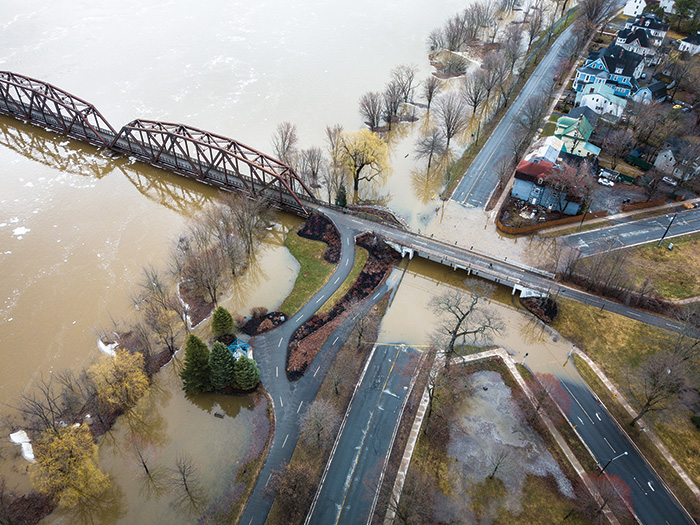Risk Scenario
Missed Signals
Disclaimer: The events depicted in this scenario are fictitious. Any similarity to any corporation or person, living or dead, is merely coincidental.
An Act of Violence
Alex Block settled down on a sunny afternoon in May of 2015 at the counter of Presto, a regionally famous sandwich shop in Pittsburgh, and hungrily eyed the pastrami sandwich on his plate.

Thick slices of white Italian bread stuffed with French fries, coleslaw and sweet-spicy, aromatic meat shaved super-thin. This was not the time to second-guess on the calories. This moment called for just diving right in.
Block’s self-indulgence felt justified. Three years ago, he’d returned to this former mill town, his bank accounts bulging with cash from a 14-year career as a Wall Street investment banker.
What he did with about $4 million of that cash got tongues wagging. It even got him a headline on the front page of the local business paper.
Block invested in his grandfather’s former aluminum fabrication company in nearby Lawrenceville with the idea of bringing it back as an aluminum decking company, dubbed Sarachelle Decking, Inc. The first word of the company name was a combination of the names of Alex’s two daughters, Sara and Rochelle.
Some online commentators greeted the news with ridicule. Block’s business looked to some like a bone-headed move spurred by nostalgia.
“This ain’t the Steel City no more, buddy,” grumbled an out-of-work ironworker, commenting on the online news story about the launch of this small to mid-sized company. Many in the Pittsburgh manufacturing community thought that Block would never make it in manufacturing.
But Block was no bonehead. He put his Wharton MBA and his curiosity to good use, researching South American bauxite production to identify lesser known suppliers who would give him a price advantage over larger companies.
It was in Guyana that he found the bauxite producer that made the whole thing click for his company. He added to that advantage by lining up a local smelter that he found through his business school contacts.
Now, three years later, the glimmer of real gold was appearing. Just this spring, Force-Tek, one of the publicly traded railroad and highway infrastructure companies, picked up his product in a seven-figure contract. Who was laughing now?
What better way to toast his success than with a stuffed sandwich at Presto’s? That form of celebration was a personal tradition that dated back to his high school days when Alex’s father would proudly treat him when he won wrestling matches.
Block made short work of the French fry-stuffed pastrami sandwich. As he finished off his diet cream soda, his eyes settled on the television set above the lunch counter. A news report showed footage of Venezuelan troops pouring over the Guyanese border. A long-simmering border dispute was erupting into armed conflict.
The operation providing Block’s bauxite was located a mere 200 miles to the east of the Venezuelan border incursion. The image of the Venezuelan troops stopped Block cold.
In an instant Block’s mind ran through the possibilities.
The degree to which the bauxite plant itself was threatened was one area of concern. But Block’s Guyanese producer was also heavily dependent on labor from the neighboring country of Suriname.
Even if the bauxite plant wasn’t captured or otherwise affected, it could suffer business interruption if its labor supply was blocked.
“How long the dispute will last and to what degree it will embroil neighboring Suriname are unknowns,” said the British-accented broadcaster.
“But one thing is certain,” he continued. “Business and personal travel in this area of the world will be inadvisable for weeks, possibly months to come.”
“No kidding,” Block said out loud to himself, eliciting a sharp, critical glance from a co-ed sitting on the next stool, apparently peeved that Block had interrupted her concentration as she thumbed through her iPhone.
In one afternoon, Alex Block’s bright business prospects darkened considerably. The pastrami sandwich that he’d rationalized as an earned indulgence now sat heavy in his stomach.
Outflanked
The Venezuelan incursion accomplished just what Block feared it would do.

Officials in Suriname tightened down their borders, blocking the movement of workers into Guyana for three months.
A months-long military border dispute between Venezuela and Guyana claimed dozens of lives per week. The fighting never escalated to a country-wide engagement, but the damage to the sustainability of Sarachelle Decking was done. Block’s Guyanese bauxite producer was forced to cease production until the situation stabilized.
Block moved quickly to identify another bauxite producer but he was outflanked.
He was forced to compete with larger aluminum makers and fabricators for bauxite from their existing suppliers. The higher price from those bauxite producers erased a key business advantage.
In a meeting with his CFO, Block faced the music.
“We’ve got margin erosion here that worries me greatly,” said the CFO, Kristian Moorehead.
The company was meeting its production obligations to Force-Tek and other key customers, but it was looking at an operating loss within one more quarter if it couldn’t cut costs.
Even with a full order book, Block did what he felt he had to do and laid off a shift. Maybe the layoff was too much too soon, an over-reaction, but Block was Wall Street trained. You didn’t wait, you acted.
The news sent ripples through the Pittsburgh manufacturing community and was gleefully picked up on by Block’s competitors.
“They’re not going to be around long,” was what a salesmen for one of the company’s competitors told a customer in the Midwest, where Sarachelle Decking did most of its business.
“Why do you say that?” said the customer.
“For one, they source from Guyana, which is under attack from Venezuela if you haven’t noticed,” the salesman said.
“Secondly, they’ve only been in business four years and they just laid off an entire shift last month,” the salesman said.
“I think you better ask yourself what it’s going to do to your business if you buy from them and they go under,” he added.
“I guess I’ll have to take that under advisement,” the customer said.
***
Alex Block was not an insurance naïf. His due diligence work as an investment banker gave him more than a passing acquaintance with products such as property insurance, D&O insurance, workers’ compensation, environmental insurance and other coverages.
As he scrambled to save his company and the prolonged Guyana-Venezuela strife played out, Block and his CFO examined their coverages to see if they could find relief.
They did not find relief. What they found were gaps, not only in their coverage but in their risk management strategy.
Back to the Drawing Board
As an event beyond his control, Alex Block couldn’t help but think that the conflict in South America that deprived him of a key supplier should have been compensable from an insurance standpoint.

After all, wasn’t it comparable to a storm or flood knocking out his factory for a few weeks or even longer? The answer was that it was, and it wasn’t.
Supply-chain insurance that would have provided a payout on the clear supply-chain disruption that Sarachelle Decking suffered wasn’t in place.
On the risk mitigation end, Block was so enamored of the business advantage his Guyanese bauxite supplier gave him that he didn’t look at the flip side. He failed to imagine what losing it would do to him and failed to arrange for back-up low-cost suppliers.
Over drinks with a pal from his Wharton days, Block got the lowdown on what he should have known and done going in.
“I mean the supply chain cover is something you arguably might not have been able to get to begin with,” his friend said between sips of his vodka martini.
“It’s not like there’s that much coverage out there and with your limits the carriers that handle that might have passed on you,” he said.
“But the supply chain analysis, you should have done and could have done,” he said. “It would have pointed out that your strength and your weakness were both coming from the same supplier,” he said.
“And a contingency plan?” his friend said.
“If I’d known …” Alex began.
“If you’d known. But good to have in any event,” his friend said.
With no end to the South American conflict in sight, Sarachelle Decking was locked into a bauxite price that gradually undermined its ability to compete.
The company was able to function for a full two years beyond the day that Block first axed one of the production shifts.
But in 2017, the day came when Alex Block’s dream of resurrecting his grandfather’s company came to an end. The same reporter that wrote a front page business journal story on him in 2012 visited him to write the epitaph on Sarachelle Decking.
In the five years he’d been in Pittsburgh, Alex Block had gotten used to the feel of a smaller town. His New York days seemed like a distant memory. This was his hometown after all.
But something told him he’d be back in that rat race before long.
![]()
Risk & Insurance partnered with the Society of Actuaries (SOA) to produce this scenario. Below are perspectives from an actuary on ways to prevent losses presented in the scenario. This perspective is not an editorial opinion of Risk & Insurance.
1. Analyze and prioritize risks: All business prospects need to be analyzed for potential pitfalls, as the business owner in the scenario did not prepare for unexpected events, such as labor shortages from regional instability or the unavailability of a critical supply point that impacted his entire supply chain.
The 2014 Emerging Risks Survey from the Joint Risk Management Section, of which the SOA is a sponsor, identifies emerging risks ranging from environmental to geopolitical. Key geopolitical risks can include:
- Interstate and civil wars
- Failed and failing states
- Regional instability
- International terrorism
- Retrenchment from globalization
The businessperson in the scenario should have considered various geopolitical risks, among other risks that impact the company. Another set of emerging risks to consider include societal:
- Pandemics and infectious disease
- Regime liability and regulatory framework issues
- Demographic shifts
2. Create relevant and actionable contingency plans: While it is important to research and identify potential shortfalls or risks presented from working with suppliers, vendors or other partners, it is also necessary to take action with this information. The loss of a key supplier, such as in this scenario, must be met with immediate action or dire consequences can occur. Planning ahead is necessary, so backup suppliers and sources of materials should be in place for the company. It is also vital to understand what risks may affect the suppliers’ business, which can ultimately impact the company too. For example, there are currency risks when dealing with suppliers based in another country, such as fluctuations in the economy, changes with the interest rates or issues with foreign exchanges.
3. Understand coverages: The risk exposures, a company’s appetite for risk and several other factors should weigh in to the decision of insurance coverage. Even if a company doesn’t have a chief risk officer, who that responsibility lies with needs to be identified and their knowledge of coverages and coverage limitations needs to be comprehensive.
4. Harness your consultants’ knowledge: The businessperson in this scenario depended too much on his own knowledge and did not seek counsel from insurance consultants or an insurance carrier, which was a vast oversight on his part. It is important to have a clear understanding of coverages and risk mitigation processes through tapping into the valuable insights of available resources and experts.
Partner Resources
For more information about SOA, please visit www.soa.org/impact












